
What is the gut microbiome? And how is it formed?
If you’ve paid even the least bit of attention to health news in the last several years, you’ve probably heard about the “gut microbiome.” It’s not exactly an easy or simple thing to define, but the basic translation is this: the human intestinal system is home to trillions of microbial cells that all work in tandem with the body and have a huge influence on health and disease.
Like a fingerprint, any given person’s intestinal microbial colony — their gut microbiome — is unique, and it affects all kinds of bodily processes, ranging from metabolism to digestion to immune system development and functioning. The gut microbiome is essential at every life stage, too, all the way from fetal development through old age. When the gut microbiome is rich and varied — healthy — there tend to be compounding positive health effects; but on the flip side, disruptions to the gut microbiome can lead to problems, including diseases and afflictions such as irritable bowel syndrome, asthma, obesity, and potentially autism.
Generally speaking, a healthy gut microbiome is diverse and bountiful.
Recent research has indicated that the development of the gut microbiome begins even before birth, in utero, and that the newborn period of infancy is critical for establishing a healthy gut microbiome. In specific, scientists note that infants go through two major periods of change to their microbiomes:
1) right after birth when they transition to nursing or formula-feeding, and
2) between 6-12 months, when they transition to solid foods and their microbiomes begin to shift more toward an adult composition.
This isn’t to say that change stops afterward — technically, the gut microbiome is always in flux — but rather that these are two early moments where we see a major shift.

Did You Know?
Scientists have learned that any number of factors can greatly influence early gut microbiome development, including:
-
Mode of delivery (vaginal birth vs. cesarean delivery)
-
Method of feeding (formula vs. breast milk)
-
Antibiotics use
-
Timing for starting solid/complementary foods
-
Weaning
-
Geography (climate, rural/urban, etc.)
By the time a child turns about three years old, her gut microbiome will be relatively similar to an adult’s in terms of the bacterial composition and diversity — and her microbiome should also generally be pretty stable through the rest of her life, barring disruptions such as a major change in diet, disease, or antibiotics.
What is the role of gut bacteria in overall health?
We could write an entire book on all the ways in which the gut microbiome can and does influence overall health… but we’re guessing you only have a few minutes. So here’s the short answer: it affects EVERYTHING. Hah.
But seriously, it’s true…
As scientists have learned more and more about the gut microbiome over the last 10-15 years, they’ve also begun to uncover what a huge role it can play in human health. In fact, researchers are saying that the microbiome may be our “second brain” and that the human body/gut microbiome dynamic might be the most important relationship in our lives (!). The more we study, the more we come to understand that the gut microbiome really does seem to have a hand in everything: nutrient absorption and synthesis, energy levels, the immune system, biochemical signaling with the brain, brain functioning, metabolic rate, growth… the list goes on. (NBD.)

In infants, the gut microbiome is super closely linked with the immune system. In the days, weeks, and months after birth, a baby’s immune cells and gut microbiome actually develop in parallel and influence each other — it’s an intimate connection. While a healthy (read: diverse and plentiful) microbiome is linked to a healthy immune system, numerous studies have demonstrated that “upsets” to the microbiome during infancy are associated with various problems. Some scientists also speculate that lower levels of bacterial diversity (or certain types of bacteria) in the gut may be linked to atopic dermatitis, asthma, or food allergies.
Part of the reason the gut microbiome and the immune system are so closely linked is due to the nature of their co-evolution. Part of the “work” of the immune system involves identifying and responding to anything “non-self” (i.e., recognizing viral cells as foreign and then mobilizing the body to “attack” those cells). The gut microbiome, though it resides within our bodies and promotes health, is technically foreign. It’s not “of us” but rather “with us” — and thus plays a key role in training the immune system. The ultimate goal is for the immune system not only to be able to distinguish between “foreign” vs. “self,” but also between beneficial vs. harmful. Put simply, the gut microbiome plays a critical role in helping to train and fine-tune the immune system to do what it needs to do. Fascinating, right?
This interplay between the gut microbiome and the immune system is one likely reason that imbalances in the gut microbiome are linked to all kinds of health issues: obesity, type 2 diabetes, hypertension, asthma, allergies, and inflammatory bowel disease, to name a few.
To summarize, let’s wrap-up with two key notes on the role of the microbiome in overall health:
- What happens early in life with the gut microbiome — i.e., establishing a rich and varied community of gut microbes in infancy and toddlerhood — is super important for setting the foundation for a healthy microbiome into childhood and adulthood.
- We humans provide the home for these microbes, which in turn provide for us by helping us to synthesize nutrients and perform various bodily processes. It’s a win-win.

What negatively impacts gut health?
Any number of things can throw off the gut microbiome’s balance — and when this happens, the body’s relationship with its gut microbes can shift from healthful to pathogenic. Here are some of the main culprits scientists know can negatively impact gut health (we’ve broken them down into three main categories — exposures, health conditions, and diet):
- Exposures
Various toxins, medicines, and environmental factors can play a role in gut health:
- Antibiotic treatment — especially early in life — can dramatically impact the structure and nature of the gut microbiome. For the most part, antibiotic medicines lead to fewer microbes and less microbial diversity.
As a note, antibiotic treatment is incredibly common — the average child living in the U.S. will, by the time he turns two years old, have received three courses of antibiotics. And antibiotics can also affect breastfeeding infants: research shows that antibiotic medications can affect breast milk when nursing mothers are prescribed treatment.
- Smoke exposure
- Air pollution
- Health Conditions
Numerous diagnoses are associated with the deterioration of the gut microbiome — although it’s important to keep in mind that currently these remain associations. In other words, scientists aren’t sure whether these conditions cause problems with the gut microbiome, or the other way around:
- Inflammatory Bowel Disease- Asthma
- Allergies
- Metabolic disorders
- Diet
Last but not least — what we eat everyday has a huge influence on the gut microbiome! Without wading too far into the weeds, we can safely say that the traditional Western diet — which is high in sugar, sodium, and animal protein and relies on processed and over-processed foods — is deleterious for gut health. In contrast, diets such as the Mediterranean diet — which are rich in fruits, vegetables, unsaturated fats, nuts, legumes, and whole grains — are highly beneficial for the gut microbiome. Consuming a variety of fresh, wholesome, unprocessed foods promotes an abundance of microbial diversity. Another reason to eat clean!
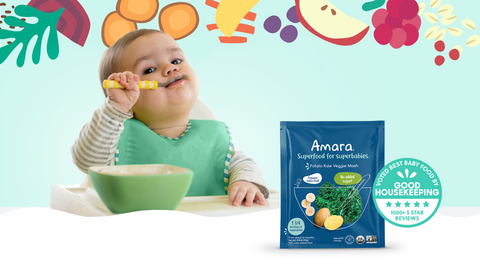
That's why we started Amara -- to make sure babies get started eating right from their very first bites. Food preferences are formed by repeated exposure, so the younger babies are introduced to flavors of fresh fruits, vegetables, and grains, the more likely they are to keep these healthy preferences for the rest of their lives. At Amara, we make serving up fresh foods easy, convenient and delicious with our revolutionary line of baby food and toddler snacks. Check out our full product line HERE.

So: how can you improve your child’s gut health?
To a certain extent, there are steps we can take as parents to help our children develop a healthy, rich gut microbiome. They all exist somewhere on the spectrum from “I have complete over this” to “it’s entirely out of my hands” — and each “choice” may present differently for every family.
Here are a few things you can (try to) do to help boost your child’s gut microbiome… but please note: there’s already too much Mom Guilt in the world for all of us, so don’t stress or obsess over what you can’t control — take action where you want and are able, and don’t worry about the rest:
- If you can, opt for a vaginal delivery over a cesarean section;
- If you can, opt to breastfeed, even if it’s only part-time;
- As much as possible, limit your child’s environmental exposure to smoke and air pollution;
- Avoid unnecessary antibiotic regimens (***please consult with your doctor here — we’re not suggesting anyone who needs antibiotics refuse them!);
- Get off the sanitation train — exposure to “dirty” things and environments, such as pets, actual dirt, and my favorite, siblings (!), is actually great for the gut microbiome. In fact, children who have more older siblings have more rich and varied gut microbes already at eighteen months; and the same goes for pets!
- Eat a healthy diet and offer healthy, wholesome, diverse foods to your children. Check out our line of organic baby foods and toddler sncaks with zero added sugar HERE.

Diet may be the arena in which we have the greatest amount of control when it comes to boosting our gut microbiome. Science consistently shows that consuming unprocessed foods across food groups is beneficial for gut health — and since so much is happening with microbiome development during infancy and toddlerhood, this is the best time to start!
While traditional baby food companies strip whole foods of their natural nutrients, Amara does the opposite: our nutrient protection processing techniques conserve the natural structure and nutrients of fresh, whole foods. Every Amara meal is made from real, whole foods that deliver the nutrients babies need to grow and develop healthfully — and we work together with a nutrition PhD and a chef to ensure that all of our offerings are as nutritionally balanced as they are delicious. Amara makes it easy to help your little one develop a rich and diverse gut microbiome, right from the first bite.
Article researched by:
Amara's Chief Nutritionist: Sonia A. Schiess, PhD in Nutrition, specialized in the introduction of solids and liquids to infants. Sonia's passion started when she was studying nutrition and dietetics in university, completing a post degree in Human Nutrition. Later on, she completed her PhD as a nutritionist, with a focus on introducing food in the first year of a baby's life. Her wide experience gives her a unique perspective, drawing from her time in clinics, hospitals, independent consulting and university research. She's authored several papers including "Introduction of complementary feeding"; "Introduction of potentially allergenic foods in the infant's diet during the first year of life" and "Intake of energy providing liquids during the first year of life" in five European countries. The combination of Sonia's science and our chef's magic ensures every Amara product is not only optimized for your baby's health but is delicious as well.

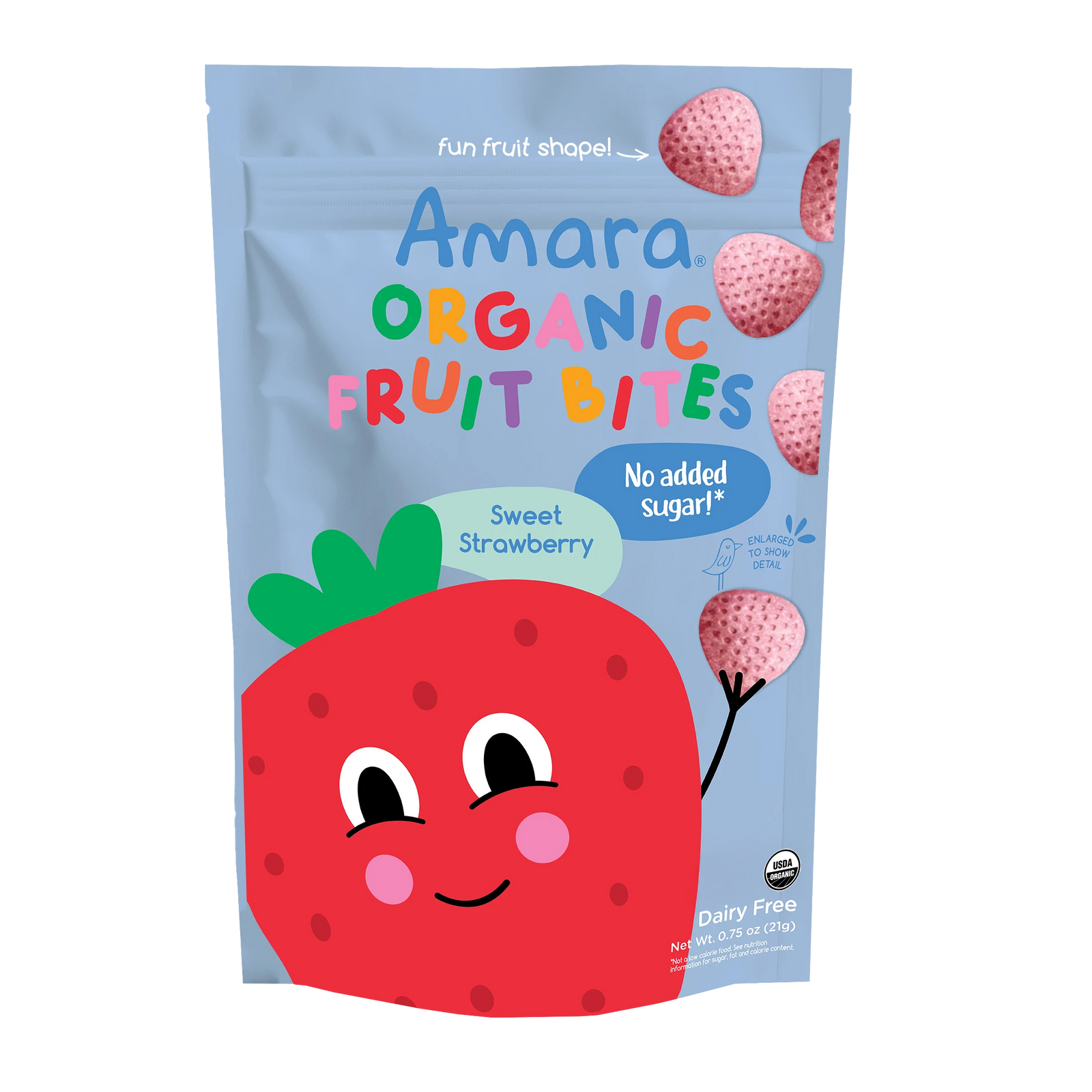


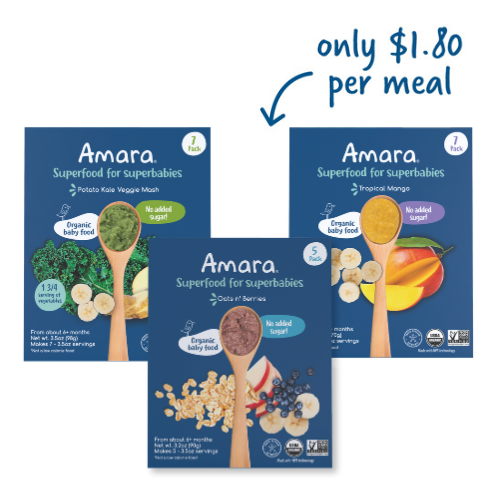
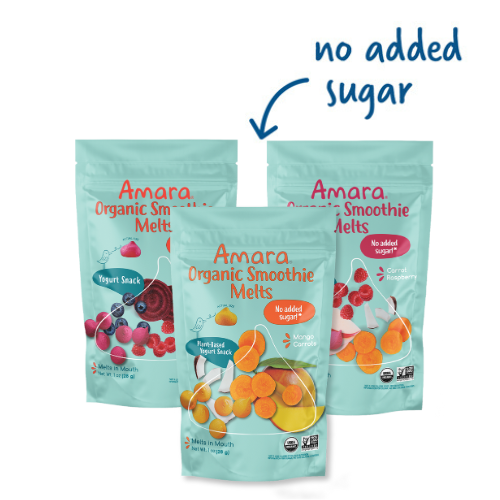
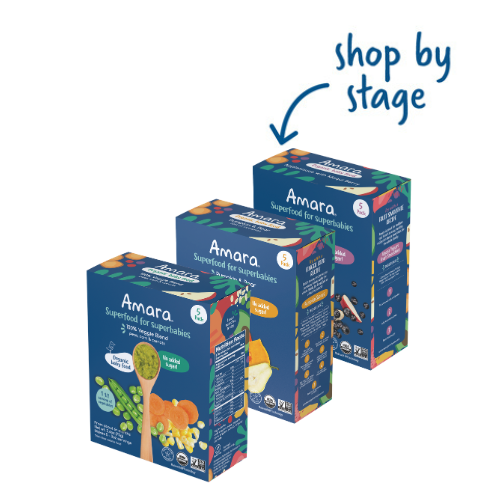
Leave A Comment